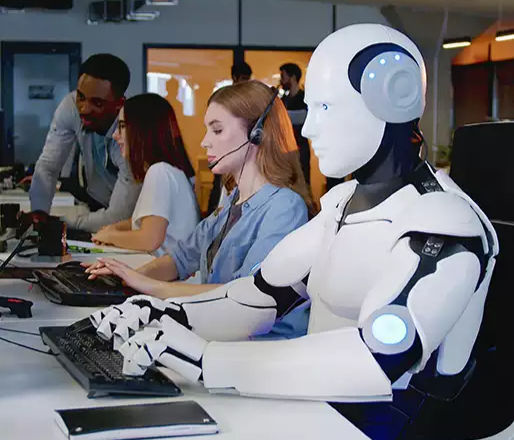The Real Possibility of AI Taking Over the Job Market in 2025
- TrustedWeb™

- Feb 9
- 3 min read
Updated: Feb 12

Introduction
As artificial intelligence (AI) continues to evolve at an unprecedented pace, its impact on the job market is becoming increasingly significant. With automation and machine learning advancing rapidly, 2025 could mark a turning point where AI-driven systems replace human labor across various industries. While some see this as an opportunity for progress, others fear mass job displacement and economic instability. The real question is: how much will AI actually take over the job market in 2025, and what can we do to prepare?
The Acceleration of AI in the Workforce
In recent years, AI has already disrupted industries such as manufacturing, customer service, healthcare, and finance. Automated chatbots, AI-powered analytics, and self-learning algorithms have streamlined operations and increased efficiency. However, the real transformation is happening in roles once thought to be exclusively human—creative jobs, legal analysis, and even medical diagnostics.
Customer Service & Sales: AI-driven chatbots and voice assistants are handling customer inquiries with increasing accuracy. Companies like Amazon and Google continue to refine their AI support systems, reducing the need for human customer service representatives.
Healthcare & Diagnostics: AI has made significant strides in medical imaging and diagnostics, allowing machines to detect diseases such as cancer with higher accuracy than human doctors.
Finance & Banking: AI algorithms now manage stock trading, credit risk assessment, and fraud detection at speeds far beyond human capability.
Content Creation & Marketing: AI tools like ChatGPT, DALL·E, and MidJourney are creating articles, videos, and graphics with little human intervention, challenging traditional marketing and creative roles.
With these rapid advancements, the concern is that by 2025, many jobs could be eliminated, leaving millions without employment or forcing workers to upskill at an unprecedented rate.
The Threat of Mass Job Displacement
While AI offers incredible efficiency and productivity benefits, it also raises significant concerns about job displacement. According to studies by the World Economic Forum, nearly 85 million jobs could be displaced by AI and automation by 2025. However, the same report suggests that 97 million new roles could emerge, primarily in AI development, data science, and robotics.
Despite this potential job creation, the transition could be painful. The biggest risks include:
Job Polarization: While AI creates new high-tech jobs, low-skilled and middle-income workers may struggle to transition into new roles, widening economic inequality.
Skill Gaps: Many workers will need extensive retraining, but education systems and employers may not be prepared to provide the necessary skills fast enough.
AI Bias & Ethical Issues: Automation isn’t perfect—AI models can inherit biases and make unfair decisions in hiring, credit approval, or legal matters, potentially harming vulnerable groups.
How to Prepare for the AI Revolution
Instead of fearing AI, professionals and businesses should focus on adapting to this inevitable shift. Here are some key strategies:
Upskilling & Reskilling – Workers should invest in acquiring digital and AI-related skills. Learning coding, data analytics, and AI operations can future-proof careers.
Emphasizing Human-Centric Roles – Jobs that require emotional intelligence, critical thinking, and creativity—such as therapists, social workers, and strategic decision-makers—will remain difficult to automate.
Government & Policy Support – Policymakers need to ensure a smooth transition by providing job training programs, implementing AI regulations, and encouraging ethical AI deployment.
Businesses Adapting AI Responsibly – Companies should implement AI as an enhancement rather than a replacement, ensuring that human workers are upskilled rather than displaced.
Conclusion
The reality of AI taking over the job market in 2025 is complex. While automation will undoubtedly replace many traditional jobs, it will also create new opportunities that we must be ready to embrace. Instead of resisting change, individuals and organizations must proactively prepare by learning new skills, adapting to AI-driven work environments, and ensuring ethical AI integration. The future of work is shifting, and those who prepare for AI’s impact will be the ones who thrive in the new digital economy.




Very interesting. Hehe. Did AI write this?